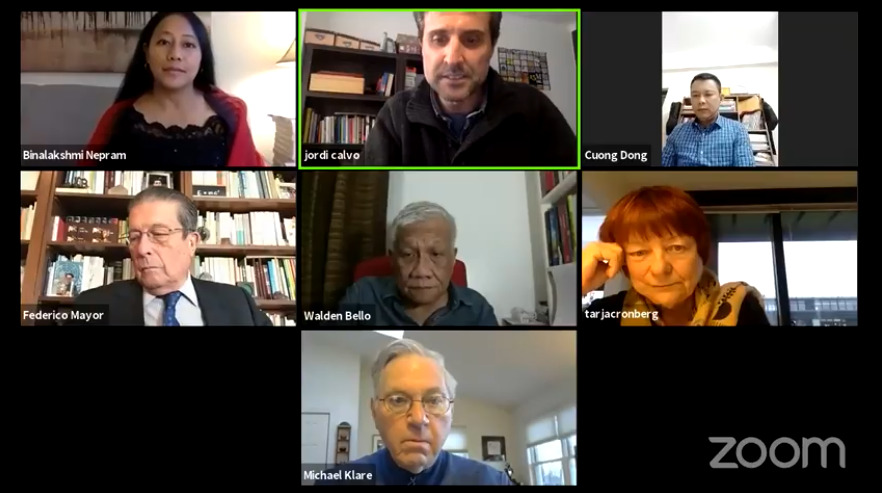More on our webinar on Military Spending last Thursday.
Last Thursday, December 3, GCOMS hosted a succesful webinar on Military Spending and Global (In)Security. The event was moderated by GCOMS coordinator Jordi Calvo and AEPF representative Dong Huy Cuong, and had Michael T. Klare, Tarja Cronberg, Walden Bello, Binalakshmi Nepram as speakers. Closing remarks were made by Federico Mayor Zaragoza, former UNESCO Director General.
This online conference presented an excellent space for discussion, and introduced many relevant and urgent matters. The approach on military spending and global security discussed was very original and made up for a very powerful final statement, appealing to peace activists around the world to take action for the reduction of military spending and the redirection of those funds to people and the planet.
You can watch the full conference on our YouTube Channel.
Michael Klare, Five College Professor Emeritus and Director of the Five College Program in Peace and World Security Studies (PAWSS), spoke about military doctrine, which he noted has “an enormous influence on the orientation and deployment of a nation’s armed forces”. Professor Klare alsonalysed the US’ National Security and Defense Policies, arguing that while military strategic doctrine does not change often, we are now experiencing a transition from the so-called War on Terror to what is known as “great power competition” or “tri-policy”.
Distinguished Associate Fellow with the SIPRI European Security Policy, Tarja Cronberg, in turn, spoke about “securitization as a link between military budgets and human needs”, and noted that the military is increasing its use of our resources. Moreover, she spoke about poverty and climate change, and argued that if the money invested in the military was spent in education or healthcare there would be 45 times more employment in these fields. Lastly, she noted an often overlooked aspect of nuclear weapons, also very costly: “The amount of resources needed to destroy a nuclear weapon is three to four times more than that to make one. Scientists who make weapons of mass destruction have not thought about ways of destroying them when they make them”.
Filipino scholar and columnist for Foreign Policy in Focus Walden Flores Bello then discussed the US and China relations, compared their military spending and noted that there are concerns that the conflict between the two “could at some point spill over into some form of military conflict”. In addition, he spoke about their contrasting strategic postures, noting that the US’ is “offensive” and China’s is “strategic defense”, and closed his intervention raising some interesting points about the conflict in the South China Sea.
Indigenous scholar, published author and civil rights activist Binalakshmi “Bina” Nepram began speaking about the militarization of her home state of Manipur (India), and discussed how India is the second largest importer of weapons in the world and the third largest military spender. She also brought attention to how “India and Pakistan are buying weaponry from the Global North” and noted that “the five members of the UN Security Council produce 88% of the world’s weaponry”. Lastly, she brought attention to how in the US “of every 1$ a citizen pays, 55 cents go to the military-industrial complex, which only protects the interests of the 1%”
Finally, former UNESCO director Federico Mayor Zaragoza, advocated for the concept of human security, which is rooted in the idea that “every human being deserves a dignified life”, and noted how “4 billion dollars per day are being invested in army and military expenditures while thousands of human beings are dying from hunger every day”.
Closing the webinar, Jordi Calvo briefly talked about the GCOMS book “Military Spending and Global Security. Humanitarian and Environmental Perspectives”, which was published by Routledge on November 26.
You can find more information on this book here.

The organisers, want to express their most sincere gratitude to all speakers for making this webinar possible, in the belief that this webinar can be a valuable material for many activists and scholars concerned about militarization and military spending around the world.



